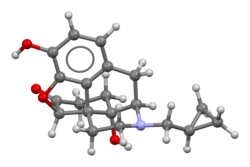
Back نالتريكسون Arabic نالتروکسان AZB Налтрексон Bulgarian Naltrexon Czech Naltrecson Welsh Naltrexon German Naltrexona Spanish نالتروکسان Persian Naltreksoni Finnish Naltrexone French
 | |
 | |
| Clinical data | |
|---|---|
| Pronunciation | /ˌnælˈtrɛksoʊn/ |
| Trade names | Revia, Vivitrol, Depade, others |
| Other names | EN-1639A; UM-792; ALKS-6428; N-cyclopropylmethylnoroxymorphone; N-cyclopropylmethyl-14-hydroxydihydromorphinone; 17-(cyclopropylmethyl)-4,5α-epoxy-3,14-dihydroxymorphinan-6-one |
| AHFS/Drugs.com | Monograph |
| MedlinePlus | a685041 |
| License data |
|
| Pregnancy category |
|
| Routes of administration | By mouth, intramuscular, subcutaneous implant |
| ATC code | |
| Legal status | |
| Legal status | |
| Pharmacokinetic data | |
| Bioavailability | 5–60%[6][7] |
| Protein binding | 20%[6][3] |
| Metabolism | Liver (non-CYP450)[11] |
| Metabolites | 6β-Naltrexol, others[6] |
| Onset of action | 30 minutes[8] |
| Elimination half-life | Oral (Revia):[3] • Naltrexone: 4 hours • 6β-Naltrexol: 13 hours Oral (Contrave):[4] • Naltrexone: 5 hours IM (Vivitrol):[5] • Naltrexone: 5–10 days • 6β-Naltrexol: 5–10 days |
| Duration of action | >72 hours[6][9][10] |
| Excretion | Urine[3] |
| Identifiers | |
| |
| CAS Number | |
| PubChem CID | |
| IUPHAR/BPS | |
| DrugBank | |
| ChemSpider | |
| UNII | |
| KEGG | |
| ChEBI | |
| ChEMBL | |
| CompTox Dashboard (EPA) | |
| ECHA InfoCard | 100.036.939 |
| Chemical and physical data | |
| Formula | C20H23NO4 |
| Molar mass | 341.407 g·mol−1 |
| 3D model (JSmol) | |
| Melting point | 169 °C (336 °F) |
| |
| |
| (verify) | |
Naltrexone, sold under the brand name Revia among others, is a medication primarily used to manage alcohol use or opioid use disorder by reducing cravings and feelings of euphoria associated with substance use disorder.[8] It has also been found effective in the treatment of other addictions and may be used for them off-label.[12] An opioid-dependent person should not receive naltrexone before detoxification.[8] It is taken orally or by injection into a muscle.[8] Effects begin within 30 minutes,[8] though a decreased desire for opioids may take a few weeks to occur.[8]
Side effects may include trouble sleeping, anxiety, nausea, and headaches.[8] In those still on opioids, opioid withdrawal may occur.[8] Use is not recommended in people with liver failure.[8] It is unclear if use is safe during pregnancy.[8][13] Naltrexone is an opioid antagonist and works by blocking the effects of opioids, including both opioid drugs as well as opioids naturally produced in the brain.[8]
Naltrexone was first made in 1965 and was approved for medical use in the United States in 1984.[8][14] Naltrexone, as naltrexone/bupropion (brand name Contrave), is also used to treat obesity.[15] It is on the World Health Organization's List of Essential Medicines.[16] In 2021, it was the 254th most commonly prescribed medication in the United States, with more than 1 million prescriptions.[17][18]
- ^ "Prescription medicines: registration of new generic medicines and biosimilar medicines, 2017". Therapeutic Goods Administration (TGA). 21 June 2022. Retrieved 30 March 2024.
- ^ Anvisa (31 March 2023). "RDC Nº 784 – Listas de Substâncias Entorpecentes, Psicotrópicas, Precursoras e Outras sob Controle Especial" [Collegiate Board Resolution No. 784 - Lists of Narcotic, Psychotropic, Precursor, and Other Substances under Special Control] (in Brazilian Portuguese). Diário Oficial da União (published 4 April 2023). Archived from the original on 3 August 2023. Retrieved 16 August 2023.
- ^ a b c d "Revia (naltrexone hydrochloride tablets USP50 mgOpioid Antagonist". DailyMed. 24 April 2015. Archived from the original on 14 June 2022. Retrieved 13 June 2022.
- ^ a b "Contrave Extended-Release – naltrexone hydrochloride and bupropion hydrochloride tablet, extended release". DailyMed. 4 November 2021. Archived from the original on 4 June 2020. Retrieved 13 June 2022.
- ^ a b "Vivitrol- naltrexone kit". DailyMed. 10 March 2021. Archived from the original on 30 May 2022. Retrieved 13 June 2022.
- ^ a b c d Cite error: The named reference
pmid2836152was invoked but never defined (see the help page). - ^ Cite error: The named reference
pmid19537999was invoked but never defined (see the help page). - ^ a b c d e f g h i j k l "Naltrexone Monograph for Professionals". Drugs.com. American Society of Health-System Pharmacists. Archived from the original on 9 November 2017. Retrieved 9 November 2017.
- ^ Cite error: The named reference
ColasantiLingford-HughesNutt2013was invoked but never defined (see the help page). - ^ Cite error: The named reference
pmid2839637was invoked but never defined (see the help page). - ^ Sevarino KA, Kosten TR (2009). "Naltrexone for Initiation and Maintenance of Opiate Abstinence". In Dean RL, Bilsky EJ, Negus SS (eds.). Opiate Receptors and Antagonists. Humana Press. pp. 227–245. doi:10.1007/978-1-59745-197-0_12. ISBN 978-1-58829-881-2.
- ^ Cite error: The named reference
pmid27401883was invoked but never defined (see the help page). - ^ Tran TH, Griffin BL, Stone RH, Vest KM, Todd TJ (July 2017). "Methadone, Buprenorphine, and Naltrexone for the Treatment of Opioid Use Disorder in Pregnant Women". Pharmacotherapy. 37 (7): 824–839. doi:10.1002/phar.1958. PMID 28543191. S2CID 13772333.
- ^ Sadock BJ, Sadock VA, Sussman N (2012). Kaplan & Sadock's Pocket Handbook of Psychiatric Drug Treatment. Lippincott Williams & Wilkins. p. 265. ISBN 978-1451154467. Archived from the original on 5 December 2017.
- ^ "Naltrexone/bupropion for obesity". Drug and Therapeutics Bulletin. 55 (11): 126–129. November 2017. doi:10.1136/dtb.2017.11.0550. PMID 29117992. S2CID 547660.
- ^ World Health Organization (2023). The selection and use of essential medicines 2023: web annex A: World Health Organization model list of essential medicines: 23rd list. Geneva: WHO. hdl:10665/371090. WHO/MHP/HPS/EML/2023.02.
- ^ "The Top 300 of 2021". ClinCalc. Archived from the original on 15 January 2024. Retrieved 14 January 2024.
- ^ "Naltrexone - Drug Usage Statistics". ClinCalc. Retrieved 14 January 2024.